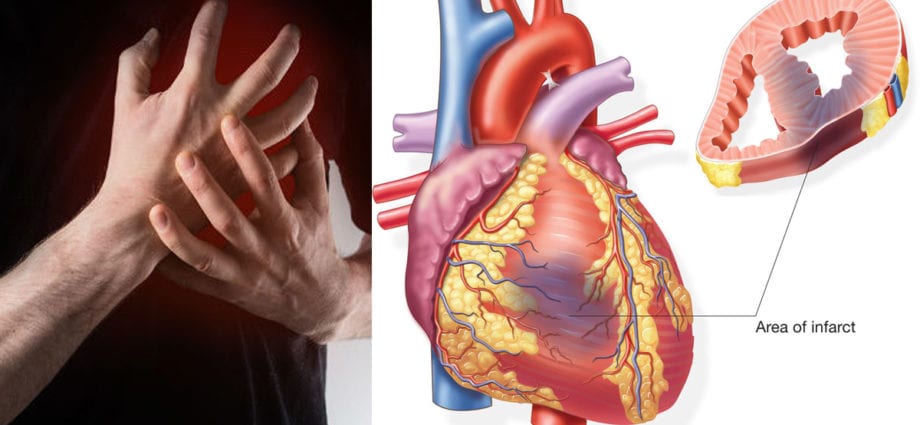Contents
General description of the disease
With myocardial infarction, partial death of the heart muscle occurs, leading to serious disorders in the entire cardiovascular system. During a myocardial infarction, blood flow to the contracting heart muscle weakens or stops completely, which causes muscle cells to die.
Read also our dedicated article Nutrition for the Heart.
The reasons may be:
- hypertension;
- atherosclerosis;
- smoking;
- cardiac ischemia;
- sedentary lifestyle;
- excess weight.
Symptoms of the disease:
- 1 Severe pain behind the sternum in the region of the heart, often radiating to the neck, arm, back;
- 2 Changes in the activity of the heart, recorded using an electrocardiogram;
- 3 Violation of the biochemical composition of the blood;
- 4 There may be fainting, cold sweat appear, severe pallor.
Due to the fact that the symptoms are not pronounced, and myocardial infarction can manifest itself in different ways, this disease is often mistaken for other pathologies. And only a comprehensive examination, including ultrasound, tests, cardiogram, can make the correct diagnosis and save the patient.
Useful foods for myocardial infarction
Proper nutrition during the rehabilitation period improves the function of the heart and accelerates the recovery processes in the myocardium.
In the first ten days after a heart attack, you need to follow a strict diet, which includes only low-calorie foods. Limit salt and fluid intake. It is recommended to use liquid cereals, fruit, vegetable purees and mashed soups. From meat dishes, you can boiled lean beef.
In the second half of the rehabilitation period (after two weeks), everything is taken too, but it can already be boiled, not wiped. Salt intake is limited.
After a month, during the scarring period, potassium-fortified foods are needed. It enhances the drainage of fluid from the body and increases the muscle’s ability to contract. It is useful to eat dried fruits, dates, bananas, cauliflower.
Apples should be eaten as much as possible, they help cleanse the whole body of toxins and strengthen the walls of blood vessels.
It is recommended to replace sugar with honey, as it is a natural biostimulant. Honey enriches the body with essential microelements and vitamins, dilates the heart vessels, improves blood circulation in the body and increases its protective reactions.
It is good to eat nuts, especially walnuts and almonds. Walnuts contain magnesium, which has vasodilating properties, as well as potassium, copper, cobalt, zinc, which are necessary for the formation of red blood cells.
Birch sap is very useful, you can drink it from 0,5 liters to 1 liter per day.
It is useful to eat turnips, persimmons, drink beet juice.
People who have suffered myocardial infarction need to introduce seafood into their regular diet, as they contain iodine, cobalt and copper. These trace minerals thin the blood and prevent blood clots.
Folk remedies for the treatment of myocardial infarction
During the rehabilitation period, it is very useful to take such funds.
- 1 Mix freshly squeezed onion juice in equal parts with honey. Take two, or three times a day on a spoon.
- 2 A mixture of chokeberry with honey, in a 1: 2 ratio, is very useful. Take once a day for a tablespoon.
- 3 Lemon peel improves heart muscle function. It should be chewed fresh.
- 4 In the first days of rehabilitation, carrot juice is very useful. Freshly squeezed juice should be drunk half a glass, with the addition of a little vegetable oil, twice a day. It is very useful to combine carrot juice with the use of a weak infusion of hawthorn as tea.
- 5 An effective tincture of ginseng root with honey. It is necessary to mix 20 grams of ginseng root with ½ kg of honey and stir regularly, infuse for a week. This tincture also works well with low hemoglobin levels. Take ¼ teaspoon three times a day.
Dangerous and harmful foods for myocardial infarction
Patients who have had myocardial infarction against the background of obesity need to completely revise their diet and, subsequently, contacting specialists to draw up a diet aimed at gradually reducing body weight.
People who have suffered a heart attack for some other reason, until complete rehabilitation, must completely exclude fatty, fried, flour products from their diet. It is forbidden to eat foods that lead to bloating: legumes, milk, flour products. The use of fatty and fried foods is completely contraindicated throughout the postinfarction period.
Excluded from the diet: smoked products, pickles, mushrooms, salted cheeses. Dishes cooked in meat or fish broth are contraindicated.
Enriching your body with potassium, be careful with gooseberries, radishes, sorrel, black currants, as they contain, in addition to potassium, oxalic acid, which is prohibited for heart diseases.
Attention!
The administration is not responsible for any attempt to use the information provided, and does not guarantee that it will not harm you personally. The materials cannot be used to prescribe treatment and make a diagnosis. Always consult your specialist doctor!










